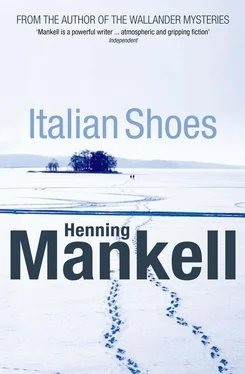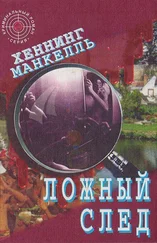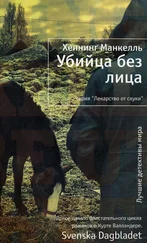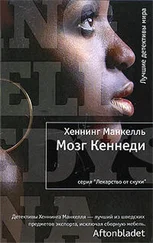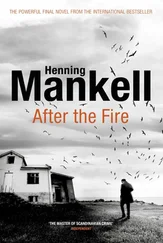‘Diamond would have been better.’
I suddenly heard lots of banging and clattering in the background. I could hear distant voices yelling and screeching, and somebody apparently banging away at a sheet of metal.
‘I’ll have to hang up now.’
‘Where are you?’
‘We’re about to arrest a man who’s running amok in a scrapyard.’
The line went dead. I tried to conjure up the scene: delicate little Anna Ledin with her pistol drawn, and her ponytail jumping up and down behind her uniform cap. I certainly wouldn’t have liked to be on the receiving end of whatever she dealt out in circumstances like that.
I decided to call the dog Carra. Obviously, part of the reason for that name was a reference to my daughter, who never kept in touch, but was interested in Caravaggio. Why does anybody give a pet a particular name? I don’t know.
It took several weeks of intensive training to persuade her to forget all about Ruby, and instead become a Carra who would run up somewhat reluctantly when I called for her.
October passed by with changeable weather — some days very hot, a sort of delayed Indian summer, but others characterised by bitterly cold winds from the north-east. Sometimes when I looked out to sea I could make out the flocks of migrating birds gathering, before suddenly setting off on their long journey southwards.
There is a special sort of melancholy that accompanies a flock of migrating birds. Just as we might feel uplifted when they return. Autumn is closing its books. Winter is approaching.
Every morning when I woke up, I could feel the aches and pains of approaching old age manifesting themselves. I sometimes worried that I could no longer pee as forcefully as I used to be capable of. There was something especially humiliating about the thought of imminent death because I could no longer pee properly. I found it hard to accept that the ancient Greek philosophers or the Roman emperors died of prostate cancer. Even if they did, of course.
I thought about my life and at times made an insignificant entry in my logbook. I stopped making a note of wind directions, or how hot or cold it was. Instead I made up the winds and the temperatures. On 27 October I made a note for future consumption that my island had been hit by a typhoon, and the temperature in the evening was plus thirty-seven degrees.
I sat in my various thinking places. My island was so marvellously formed that it was always possible to find a spot sheltered from the wind. I found such a place, sat down there and wondered why I had chosen to become the person I was. Some of the basic reasons were not difficult to find, of course. I had taken the opportunity to flee the poverty-stricken environment in which I grew up, where the daily reminder of the vulnerable life led by my father gave me sufficient strength to make the effort. But I also realised that I could be grateful for the fact that I had been born into an age in which such flights were possible. A time when the downtrodden children of humble waiters could go to university and even become doctors. But why had I become a person who always looked for hiding places instead of companionship? Why had I never wanted to have children? Why had I lived a life like a fox, with so many alternative exits from its lair?
That confounded amputation that I didn’t want to accept responsibility for was just one of those things. I wasn’t the only orthopaedic surgeon in the world to whom something like that had happened.
There were moments that autumn when I was struck by panic. It led to endless nights stuck in front of the mind-numbing television, and sleepless nights during which I both regretted and cursed the life I had lived.
In the end a letter from Louise finally arrived as a sort of lifebuoy for a drowning man. She wrote that she had spent many days emptying Harriet’s flat. She enclosed several photographs she had found among Harriet’s papers, snaps she had known nothing about. I sat staring in astonishment at the pictures of Harriet and me taken almost forty years ago. I recognised her, but was put out, almost shaken by what I looked like. In one of the photographs, taken somewhere in Stockholm in 1966, I had a beard. It was the only time in my life that I’d grown a beard, and I’d forgotten all about it. I didn’t know who’d taken the picture, but was intrigued by a man who was standing in the background, swigging vodka straight from the bottle.
I remembered him. But where had Harriet and I been going to? Where were we coming from? Who had taken the picture?
I thumbed through the photographs and was fascinated. I had locked my memories away in a room that I had sealed, and then thrown the keys away.
Louise wrote that she had rediscovered a lot of her childhood during the days and weeks she had spent emptying the flat.
‘What struck me most of all was that I had never really known anything about my mother,’ she wrote. ‘I came across letters, and occasional diaries that she’d never kept going for very long, containing her thoughts and experiences that she had never passed on to me. For instance, she’d dreamt about becoming a pilot. She always used to tell me that she was scared to death whenever she was forced to take a flight. She wanted to create a rose garden on Gotland, and she’d tried to write a book but never been able to finish it. But what affected me most was that I discovered she had told me so many untruths. Memories from my childhood kept cropping up, and over and over again I realised that she had lied to me. Once she told me that one of her friends was ill and she had to visit her. I remember crying and begging her to stay, but she said her friend was so seriously ill that she really had to go and see her. I now realise that, in fact, she went to France with a man she hoped to marry — but he soon disappeared out of her life. I won’t bore you with all the details of what I’ve discovered here, but one lesson I’ve learned is that it’s essential to sort out your belongings and throw away a lot of stuff before you die. I’m surprised that Harriet didn’t do that when she’d known for such a long time that she was going to die. She must have known what I would find. The only explanation I can think of is that maybe she wanted me to realise that, in so many ways, she wasn’t who I thought she was. Was it important to her that I should know the truth, despite the fact I would see that she had lied to me so often? I still can’t make up my mind if I ought to admire her for that, or despise her. Anyway, the flat is now empty. I shall post her key through the letter box and go away. I’m going to visit those caves, and will take Caravaggio with me.’
The last sentence of her letter confused me. How could she take Caravaggio with her? Was there something between the lines that I couldn’t detect?
She had not given me an address to which I could send a reply. Nevertheless, I sat down that very same night and started writing. I commented on the photographs, told her about how my own memory had let me down, and also told her about my walks with Carra around the rocks. I tried to explain how I was feeling my way through my past life, a bit like battling through thick, thorny bushes that were almost impassable.
Most of all I wrote that I missed her. I repeated that over and over again in my letter.
I sealed the envelope, stuck a stamp on it and wrote her name. Then I left it on the desk, hoping that she might one day send an address.
I had only just gone to bed that night when the telephone rang. I was frightened, my heart was pounding. Anybody ringing me at that time of night couldn’t have good news for me. I went down to the kitchen and picked up the receiver. Carra was lying on the floor, watching me.
‘It’s Agnes. I hope I didn’t wake you.’
Читать дальше
